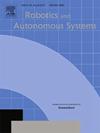Data-based controller for a soft robot actuated by ultrasonic atomization with unknown dynamics and uncertainty
IF 5.2
2区 计算机科学
Q1 AUTOMATION & CONTROL SYSTEMS
引用次数: 0
Abstract
Soft robots are increasingly indispensable in engineering and scientific applications due to their ability to navigate unstructured environments, interact with humans, and emulate biological systems. These tasks pose challenges for rigid robots. Traditional actuation methods for soft robots rely on pneumatic or hydraulic systems, which may face limitations in miniaturized soft robots. Here, a soft robot featuring an actuation system based on vibrating mesh atomization and ethanol evaporation is introduced. However, the physical process of this actuator introduces noise, non-linearity, and hysteresis during displacement and force cycles. Thus, the inherent uncertainty and lack of a dynamic model pose challenges for a classical model-based control. Existing data-based controllers typically prioritize minimizing cost functions to address this issue. In this study, a novel data-based fuzzy network controller for the discussed soft actuation is proposed, integrating an input error function within a sliding mode framework. The controller, along with its learning law, is specifically designed to tackle time-varying parameters resulting from the hysteresis and nonlinear characteristics of soft robots. Rigorous analysis is provided using the Lyapunov method to validate the proposed approach. Numerical experiments were performed using an approximate discretized nonlinear model with noise to describe the data reported in the literature. Experimental validation involves measuring the voltage of a micro-force sensor to track blocking force as a control signal to the plant. Both numerical and experimental results validate the efficacy of the proposed controller in force tracking under external perturbations.
Soft robots play an essential role in engineering and scientific applications due to their adaptability in unstructured environments, safe human interaction, and biomimetic capabilities—challenges that rigid robots face. Traditional actuation methods, such as pneumatic and hydraulic systems, exhibit limitations in miniaturized soft robots. This study presents a soft robot actuated by vibrating mesh atomization and ethanol evaporation. However, the actuator introduces noise, nonlinearity, and hysteresis, complicating model-based control. To address these challenges, a data-driven fuzzy network controller is proposed, integrating an input error function within a sliding mode framework. The controller and its learning law are designed to accommodate time-varying parameters associated with hysteresis and nonlinear behavior. Stability is rigorously analyzed using the Lyapunov method. Numerical experiments utilize a discretized nonlinear model with noise to approximate reported data. Experimental validation measures the voltage of a micro-force sensor to track blocking force as a control signal. Both numerical and experimental results confirm the controller’s effectiveness in force tracking under external perturbations.
未知动力学和不确定性超声雾化驱动软机器人的数据控制
软机器人在工程和科学应用中越来越不可或缺,因为它们具有导航非结构化环境、与人类互动和模拟生物系统的能力。这些任务对刚性机器人提出了挑战。传统的软机器人驱动方法依赖于气动或液压系统,在小型化软机器人中可能面临局限性。本文介绍了一种基于振动网格雾化和乙醇蒸发驱动系统的软体机器人。然而,该驱动器的物理过程在位移和力循环过程中引入了噪声、非线性和滞后。因此,固有的不确定性和缺乏动态模型对经典的基于模型的控制提出了挑战。现有的基于数据的控制器通常优先考虑最小化成本函数来解决这个问题。在本研究中,针对所讨论的软驱动,提出了一种新的基于数据的模糊网络控制器,该控制器将输入误差函数集成到滑模框架中。该控制器及其学习律专门用于处理软机器人的滞后和非线性特性所导致的时变参数。使用李亚普诺夫方法进行了严格的分析,以验证所提出的方法。采用带噪声的近似离散非线性模型对文献中报道的数据进行了数值实验。实验验证包括测量微力传感器的电压,以跟踪阻塞力作为对植物的控制信号。数值和实验结果验证了该控制器在外部扰动下的力跟踪效果。软机器人在工程和科学应用中发挥着至关重要的作用,因为它们在非结构化环境中的适应性,安全的人机交互和仿生能力-刚性机器人面临的挑战。传统的驱动方法,如气动和液压系统,在小型化软机器人中表现出局限性。本文研究了一种由振动网雾化和乙醇蒸发驱动的软体机器人。然而,执行器引入了噪声、非线性和滞后,使基于模型的控制复杂化。为了解决这些问题,提出了一种数据驱动的模糊网络控制器,在滑模框架内集成输入误差函数。控制器及其学习律的设计是为了适应与滞后和非线性行为相关的时变参数。用李亚普诺夫方法对稳定性进行了严格的分析。数值实验利用带有噪声的离散非线性模型来近似报告的数据。实验验证通过测量微力传感器的电压来跟踪阻塞力作为控制信号。数值和实验结果均证实了该控制器对外部扰动下力跟踪的有效性。
本文章由计算机程序翻译,如有差异,请以英文原文为准。
求助全文
约1分钟内获得全文
求助全文
来源期刊

Robotics and Autonomous Systems
工程技术-机器人学
CiteScore
9.00
自引率
7.00%
发文量
164
审稿时长
4.5 months
期刊介绍:
Robotics and Autonomous Systems will carry articles describing fundamental developments in the field of robotics, with special emphasis on autonomous systems. An important goal of this journal is to extend the state of the art in both symbolic and sensory based robot control and learning in the context of autonomous systems.
Robotics and Autonomous Systems will carry articles on the theoretical, computational and experimental aspects of autonomous systems, or modules of such systems.
 求助内容:
求助内容: 应助结果提醒方式:
应助结果提醒方式:


